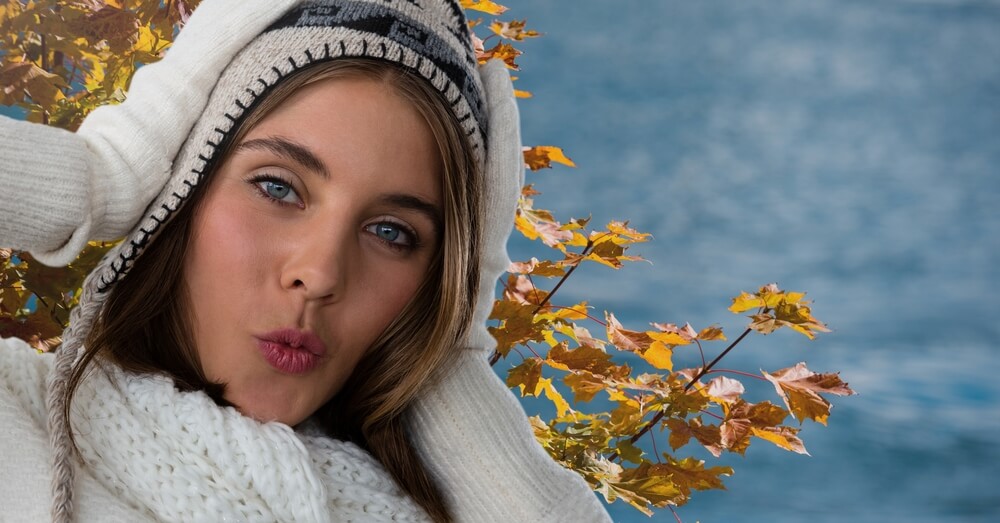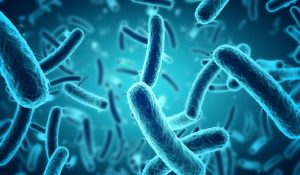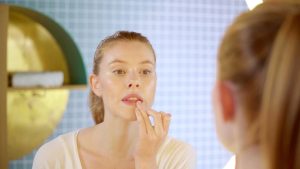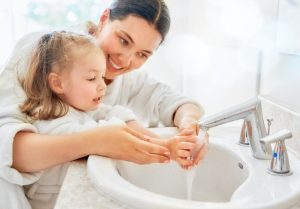The leaves are falling, the days are getting shorter and … herpes is coming! According to the WHO (World Health Organization), two out of three people worldwide carry the herpes virus (herpes simplex virus type 1). This corresponds to 3.7 billion people under the age of 50 (as of 2015).
A healthy immune system usually keeps the virus in check. However, under the influence of stress, for example, it can make itself felt in the form of painful blisters on the mouth. Autumn is also one of the seasons when many people become infected with this unpleasant and persistent virus. Unfortunately, for many people autumn and herpes are inseparable. At the beginning of fall, we take a look at the question of why and what can be done about it: Why does autumn favor cold sores?
What happens to our lips in the fall?
Autumn, with its wet, cold weather, draughts and the onset of the heating season, takes its toll on our immune system. The immune-stimulating sunlight also becomes less. In addition, we have to fight off various colds from our fellow human beings. The body often has no capacity left to contain its own herpes viruses, which are often dormant but always present.
As a result, the immune system is weakened and the herpes then blossoms overnight. It often manifests itself with itching and a feeling of tightness.
The condition of the lips is one of the reasons for this. This is because they belong to the outer mucous membranes and have no sebaceous glands or oil-water film. On cold days, they often tend to become dry, brittle and even cracked, with little protection from external influences, making it easier for viruses to enter.
What helps with cold sores?
Cold sores are unsightly, painful and unfortunately highly contagious. The level of suffering is particularly high for those who suffer from recurrent outbreaks of herpes viruses.
So how can you protect yourself from the next outbreak during the cold season? “A balanced, healthy diet is just as important for strengthening the immune system as exercise to counterbalance mental and physical stress,” says Prof. Dr. Kristian Reich from Dermatologikum Berlin. One aspect that is often neglected, especially during the transitional period in the fall, is warm clothing. “Appropriate clothing is particularly important in the fall. Viruses find it easier to penetrate a hypothermic body than at normal body temperature. It is therefore important to start the winter jacket season early. Even if you don’t actually want to wear it yet because you’re mourning the summer,” says Prof. Dr. Reich.
Virus-inhibiting creams can also provide intensive care and support when the first signs appear. It is important to apply these directly at the first signs. Simple small steps can also help to prevent herpes, for example:
- healthy nutrition
- Sufficient sleep
- Regular exercise
- Reduce stress
- Use lip care with sun protection
These factors all contribute to weakening the immune system and thus opening the door to pathogens.
Unlocking the secrets of the ocean – to protect sensitive lips
In a recent study, the World Health Organization (WHO) showed that herpes is not an individual fate, but a global problem. “According to WHO estimates published in October 2015, around two thirds of the world’s human population under the age of 50 are affected by the herpes simplex virus type 1 (HSV-1). Expressed in figures, that is 3.7 billion people,” explains Prof. Dr. Reich. So it’s no wonder that research worldwide is focusing on combating herpes viruses.
ocean pharma has been working with natural active ingredients from the ocean for years. It has taken 10 years of research to elicit the key to the natural microalgae active ingredient Spiralin® from nature.
“ The JACI (The Journal of Allergy and Clinical Immunology) reported on a novel, natural Active ingredient*. Spiralin ® is obtained from spirulina algae, which, with its antimicrobial and antiviral properties, has the best prerequisites for the development of a cold sore treatment,” emphasizes Prof. Dr. Reich.
If you have any questions, please send us an email to: info@ocean-pharma.de. You can also find out more about the right lip care and protection in challenging situations in our expert tips.
*Together with the Dermatologikum Hamburg and the German Center for Infection Research (DZIF), researchers at the Heinrich Pette Institute (HPI) have succeeded in demonstrating the efficacy of the polysaccharide calcium spirulan (Ca-SP) from the blue-green algae Spirulina platensis against the herpes simplex virus type 1 (HSV-1). An extract of the blue-green algae and in particular the polysaccharide Ca-SP contained therein prevent the attachment of HSV-1 to human keratinocytes. The polysaccharide Ca-SP is also effective against other herpes viruses. The results can be read in the “Journal of Allergy and Clinical Immunology”.
Image source: vectorfusionart / shutterstock.com






